MACRO: Oakland now has alternative to calling police for low-level calls
MACRO: Oakland now has alternative to calling police for low-level calls
A KTVU crew rode along with four MACRO teams over the course of a month, witnessing this new approach to handling non-violent 911 calls that don't require a police presence.
OAKLAND, Calif. - The man was unconscious, lying partially in the street along Hegenberger Road in East Oakland. Drivers whizzed passed as they went about their days. No one stopped to check if he was alive.
But on this day there would be help.
Two crisis intervention specialists and an EMT – from a new city program called MACRO – rustled him awake. They kneeled at his level and looked in his eyes, offering help that ranged from a simple bottle of water to temporary housing and drug treatment.
The man – who said his name was Davonte – only took the water. He appeared intoxicated. No one mentioned the folded knife resting in his lap that he likely kept for protection.
"That was a great outcome," Rob Hanna, a MACRO crisis worker, said as he drove away in the unit's white van. "We got him out of the street and gave him a bottle of water. And we got his name. Maybe he’ll want housing another time."
It's interactions like these that the Mobile Assistance Community Responders of Oakland – or MACRO – engage in every day. The 16 employees fan out in the city's most challenged neighborhoods seven days a week to respond to behavioral health issues and crisis calls that were previously left up to police – or no one at all – to handle.
The program launched in April and was born after years of a community push for non-police alternatives to non-violent issues. The police killing of George Floyd in Minnesota helped secure the political will for the program to finally get paid for. Oakland's city council chose to place the group within the fire department.
Oakland’s program is modeled after CAHOOTS in Eugene, Oregon that's been running for three decades and handles 30,000 calls a year. San Francisco and BART both recently launched their own similar programs.
"As the community sees MACRO responding, and as the other emergency services are comfortable with us responding, we'll see our role grow," the program's manager, Elliott Jones, said in a recent interview.
And the role is growing. What started as an 18-month pilot program with $5 million from the city is now budgeted for the next four years thanks to an additional $10 million grant from the state.
MORE: Call 911 to get a non-police, MACRO team response in Oakland
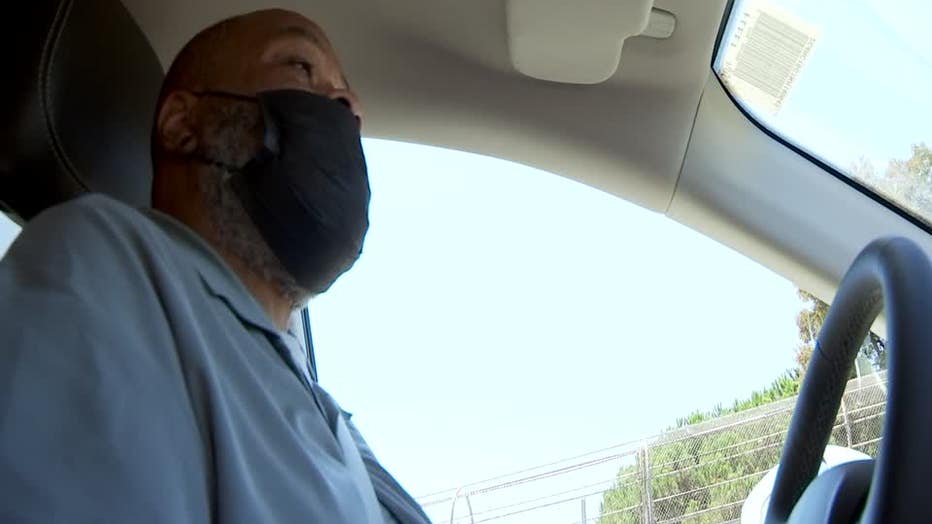
MACRO community intervention specialist Rob Hanna drives the van and has a background in gang intervention. Aug. 25, 2022
Seeing MACRO up close
KTVU spent four days over one month riding along with the MACRO teams, observing their strategies to tackle some of the city's most intractable problems like homelessness, mental illness and drug addiction.
One location they keep coming back to is on 57th Avenue and Holloway Street where a man sleeps in a large pile of trash in the roadway. He was almost loaded into the back of a garbage truck recently when his cries startled the clean-up crews.
"We're just checking in on you to make sure you're OK. Can you give me a thumbs up to make sure you're okay?" MACRO outreach worker Raul Cedeno said, calling into the trash heap.
Slowly, a hand reached out with a thumbs up before grabbing a bottle of water and disappearing back into the debris.
"This is someone we're working with and we're hoping to get them moved soon and get him in a better situation," Cedeno said.
The man is an ideal candidate for MACRO: someone who appears to be struggling with behavioral health issues and who is not acting violently. MACRO is not trained or expected to respond to anything deemed dangerous -- like armed or threatening people, or domestic violence situations.
No one on the team is armed -- a crucial tenet of their philosophy to help build trust with the communities they serve. They are not authorized to go inside private homes.
"When things get too unsafe or violent, we get out of the scene," Cedeno said. "We're not there to police anyone."
The team members say they’ve seen plenty of knives, but they will leave immediately if they're threatened with one or even spot a gun.
"If we see a gun, we’re gone," said Josh Hayes, a MACRO community intervention specialist.
No employees have been injured or encountered any seriously violent scenarios so far. Workers said they've called police to assist four times when they felt a situation was unsafe.
"We have been fortunate up to this point," Jones said. "If one person on the team is not feeling comfortable, we're not going to send you all in there."
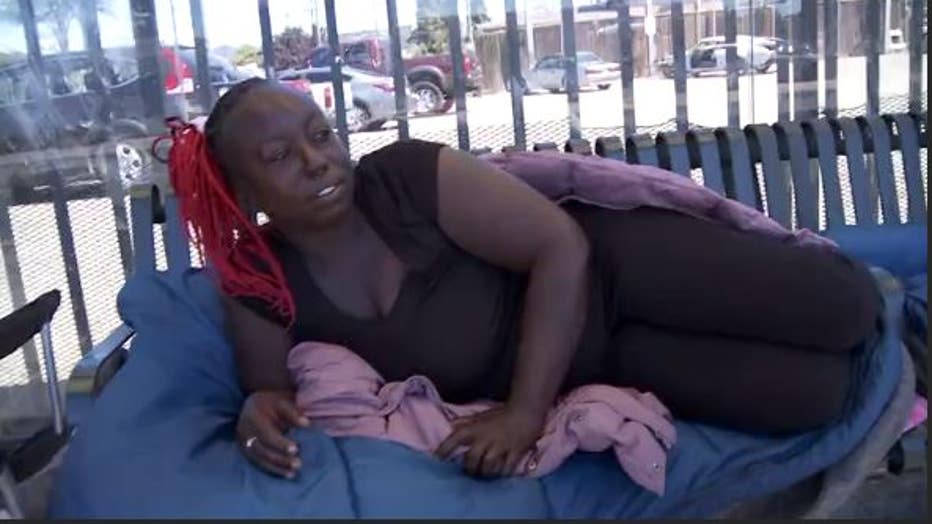
Ebony Jackson is pregnant and sleeping on a bus bench in East Oakland. The MACRO team checks on her regularly to see if she wants city services. Aug. 25, 2022
Getting ahead of the problem
The initial idea for MACRO was to have teams fielding lower-priority calls through the dispatch system, but Jones said their role has evolved to be more "proactive versus reactive."
Crews hit the streets before 8 a.m. and start checking up on people they've already established relationships with. It might start with an offer of water, and in the best-case scenarios end up with a person finding shelter and possibly services for drug addiction or mental illness.
"We've transported many people to get housing, but it took multiple contacts," Hanna said. "Before you know it, they'll wave us down. We'll pull up and they'll say, ‘You guys were telling me about that place. Is it still available?’"
MACRO hopes they'll get a request like that from Ebony Jackson, a pregnant woman who sleeps inside a bus shelter on 104th and International Boulevard. So far she's declined to accept their services, but they want to make sure she's still happy and healthy.
"I'm just chilling, relaxing, going on vacation," Jackson, a long-time Oakland resident, told KTVU.
Hanna said he hopes to get her into a shelter as soon as possible.
"Until she's prepared for that, we can't really force her being that she's pregnant," he said. "We do like to come and check up on her often."
Despite all the rejections, MACRO officials estimate they've referred more than 100 people to various services in the past two months in the two zones they serve in East and West Oakland.
Since the program began in April, they've reported 4,371 calls for service – most of which they've initiated.
But getting plugged into the dispatch system in August has not created the flood of calls that some supporters expected. So far, they field about one 911 call a day.
Jones says the low number of dispatch calls are a result of their preemptive strategy to contact people before an emergency.
"So far, things have been going very well," he said.
He added that the community is just starting to learn about MACRO and many people don't know there's now someone to call.
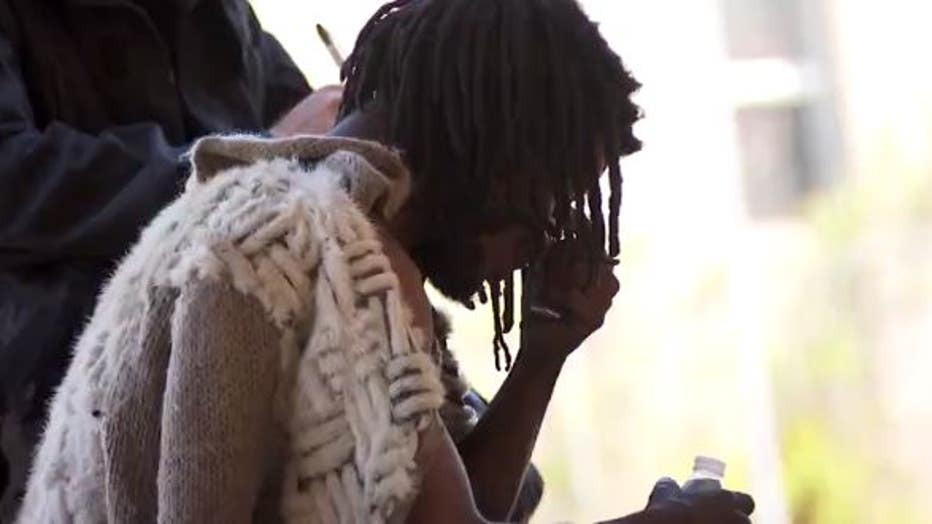
Davonte declined offers for housing, but the MACRO team will stop by again to see if he'll change his mind. Aug. 25, 2022
Is MACRO doing what it was designed for?
As of September, MACRO operates between 7 a.m. and 3 p.m. and they have yet to be tested during the evening and nighttime hours when the city often sees upticks in violence and other trouble.
They hope to expand their hours, but there are still safety concerns for the employees, who need to undergo more training.
But the low number of dispatch calls and limited hours of service has raised concerns with some in the community who initially supported the program.
"Until they start working a swing shift, MACRO is not doing what it was designed to do," said Rashidah Grinage, a founding member of the Coalition for Police Accountability that pushed lawmakers to create a program like MACRO.
But Cat Brooks, the founder of the Anti-Police Terror Project, said the naysayers just need to give it time.
"I'm usually a big critic of Oakland," Brooks said. "But MACRO is working."
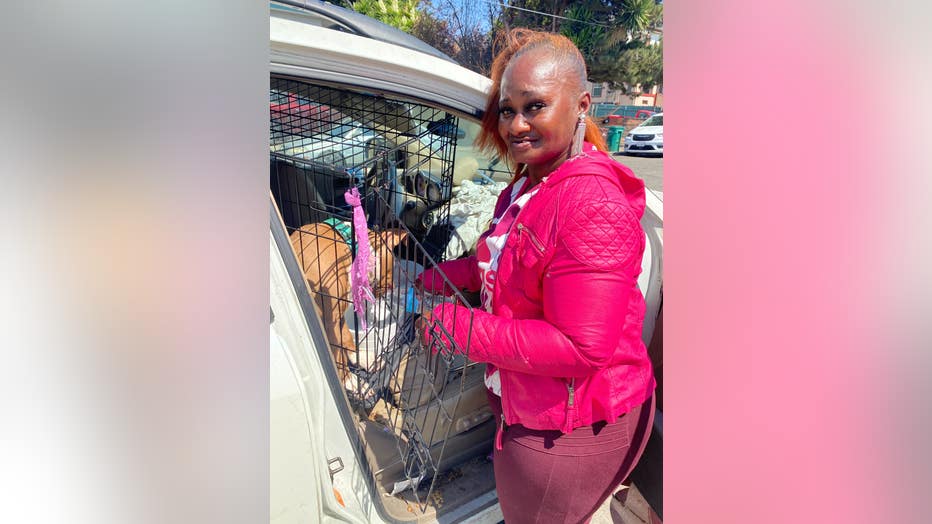
Tasharra had been living in her van during the epic hot stretch. A MACRO team was sent in to find her housing. Sept. 9, 2022
What's next after the initial call?
As MACRO teams work to connect people with services, they've found they're sometimes limited by what the city offers.
Like when they were recently called to respond to a woman named Tasharra and her family, who were living in their battered van during the triple-digit heat in early September.
Tasharra told them she had filled out all the paperwork to be accepted into a long-term housing program, but that when she arrived, she was told there was a long wait.
After the team got her information and gave her pit bull some food, they promised to make phone calls on her behalf. But more than a week later, they haven't found a stable housing program to take her family in.
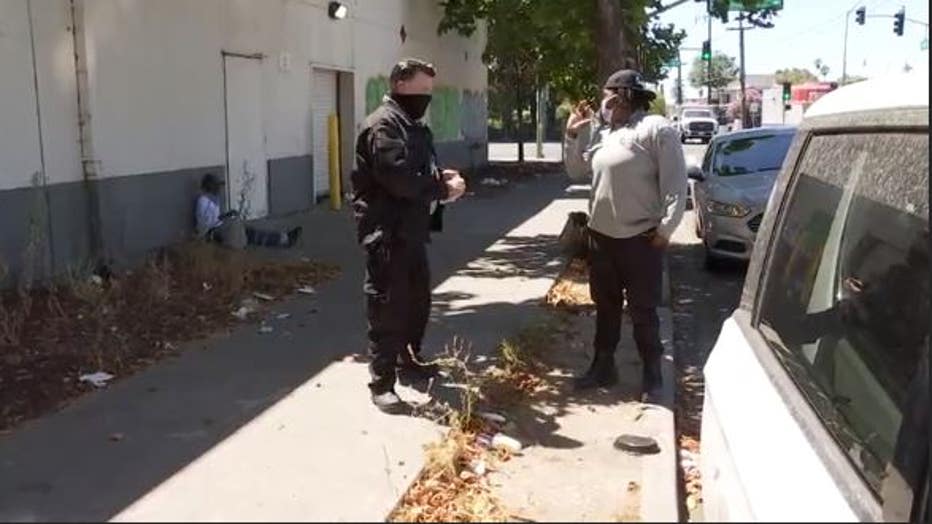
MACRO's Rick Fitzsimmons and Chiarra Duncan-Perry spot a woman who might need water and housing. September 2022
The intangible successes
But not all of MACRO's work pencils out on the balance sheet.
In Davonte's case – fire trucks and police didn't have to pull up to that scene where he was unconscious on Hegenberger Road.
"When a fire truck or a fire engine comes, there's about four or five people in the rig, it's a diesel engine that has to idle, so there are a lot of costs in just a fire truck responding," Jones said. "We can get there for dehydration, minor medical issues more effectively than they can."
And anytime police are occupied with behavioral health calls, it's time away from focusing on violent crimes in progress.
And not only that, but MACRO community intervention specialist Chiarra Duncan-Perry emphasized that the gains from helping people in desperate situations aren't just financial.
"I think people forget that these are humans and that they have feelings and emotions," she said. "They are people who need a human interaction."
Lisa Fernandez is a reporter for KTVU. Email Lisa at lisa.fernandez@fox.com or call her at 510-874-0139. Or follow her on Twitter @ljfernandez.
Evan Sernoffsky is an investigative reporter for KTVU. Email Evan at Evan.Sernoffsky@fox.com and follow him on Twitter @evansernoffsky

